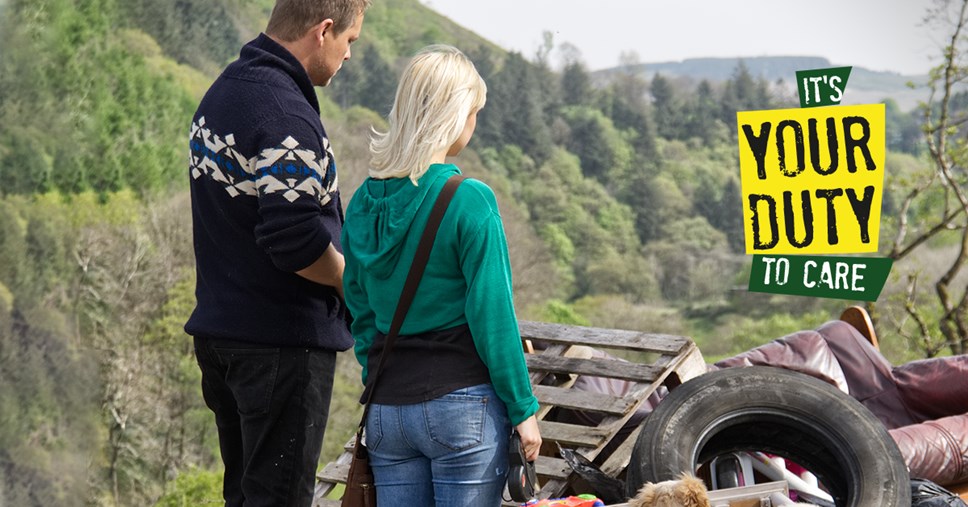
Duty of Care approach needed to combat fly-tipping
Angen Dyletswydd Gofal i fynd i’r afael â thipio anghyfreithlon
The Welsh Government Duty of Care campaign to encourage people to help tackle fly-tipping relaunches today. To remind householders in Wales that they must always use a registered waste carrier to remove unwanted household items and excess rubbish from their homes.
With over 70% of fly-tipping incidents in Wales containing household rubbish, The campaign, in partnership with Fly Tipping Action Wales, calls on people to take responsibility for their excess rubbish, keep their local area clean and avoid fines and prosecution by using their duty of care to ensure they know where their waste is going and not put it in the hands of fly-tippers.
Although Wales has led the way when it comes to the amount of waste being recycled, there has been concern over an increase in individuals posing as legitimate waste disposal businesses on social media; during the temporary closure of waste and recycling centres due to the Covid pandemic.
These individuals often use social media and low prices to dupe people into believing they are legitimate rubbish collection services, when in reality the collected waste is later fly-tipped in fields, along country lines and on the roadside.
The Welsh Government campaign urges everyone to use their duty of care and ensure all waste is disposed of legally by a registered waste carrier and to report any fly-tipping to their local authority. A list of registered waste carriers can be found on the Natural Resources Wales Website.
Other recommendations include asking waste collectors where their rubbish is going, requesting a receipt and to record details of the vehicle involved. These small steps will not only protect households from fines and prosecution but will help to combat fly-tipping in the long run.
As recycling centres across Wales reopen the Welsh Government urges people to check with their local authority to find out what restrictions or booking systems are in place alongside information on what items are being collected.
The Deputy Minister for Housing and Local Government, Hannah Blythyn said:
“Everyone in Wales has a duty of care to dispose of their household waste responsibly and to know where their rubbish is going. By working together we can combat fly-tipping and keep Wales clean.
I encourage everyone in Wales only use registered waste carriers and not put their household waste into the hand of fly-tippers, by being aware of potential scammers and adverts promoting cheap waste collection services.
Local Authorities are working hard on this issue and I don’t want to see any households duped or potentially fined as a result of trusting these unscrupulous collectors to dispose of their waste legally.”
Fly-tipping Action Wales Programme Manager, Neil Harrison, commented:
“For everyone's health and safety and out of respect for our local authority staff who are working hard to provide communities with vital services, please follow your duty of care and dispose of your waste responsibly, whilst adhering to the social distancing rules at recycling centres.
“Fly-tipping is a criminal offence and those committing this crime, particularly during a time of national emergency, place more pressure on already stretched resources and staff, whilst putting waste enforcement officers who investigate and remove fly-tipped refuse at risk.
Fly-tipping causes considerable damage to the environment, the economy and local communities — those caught fly-tipping can receive fines of up to £50,000 and/or 12 months imprisonment.”
Following Duty of Care towards waste not only protects individuals from being fined or prosecuted but also helps ensure the individual or business disposing of waste do so safely, legally and responsibly. A list of registered waste carriers can be found on the Natural Resources Wales website.
ENDS
Notes to editors
Registered waste carriers can be checked online by visiting naturalresources.wales/checkWaste
